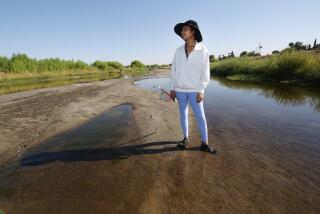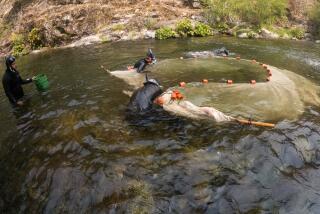U.S. Policy on Klamath Criticized
- Share via
ARCATA, Calif. — Scientists and others meeting to discuss one of the largest recorded fish kills on the Klamath River criticized the federal government’s policy for managing the waterway.
At a conference held Saturday at Humboldt State University by the American Fisheries Society, scientists blamed record low flows of water, warm temperatures and a strong salmon run for the deaths of least 34,000 Chinook salmon during two weeks in September.
The deaths represent 20% of the fall run.
Most of the fish were killed by one of three causes of infection, including a parasite, said George Guillen, who led a team of state, federal and tribal officials in surveying the kill.
The U.S. Bureau of Reclamation controls the flow of water on the river, and diverts some of it to farmers. Some scientists have criticized the practice, saying that the lower levels raise the water temperature.
“The warmer water temperature dictates how fast the diseases spread,” said Jerri Bartholomew, an Oregon State University biologist. “The flow dictates the dose -- how many parasites or bacteria the fish encounter.”
The September fish kill is one of the largest ever recorded, devastating the area’s sportfishing season and hurting Indian tribes that rely on the river for fishing.
“It was an ecological disaster unlike anything we’ve seen on the North Coast,” said Rep. Mike Thompson (D-St. Helena), the keynote speaker.
More to Read
Sign up for Essential California
The most important California stories and recommendations in your inbox every morning.
You may occasionally receive promotional content from the Los Angeles Times.










